- Головна
- Готові шкільні презентації
- Презентація на тему «Canada» (варіант 2)
Презентація на тему «Canada» (варіант 2)
365
Слайд #1
Canada
Prepared pupil of form 11-b
Iryna peretiat'ko
Prepared pupil of form 11-b
Iryna peretiat'ko
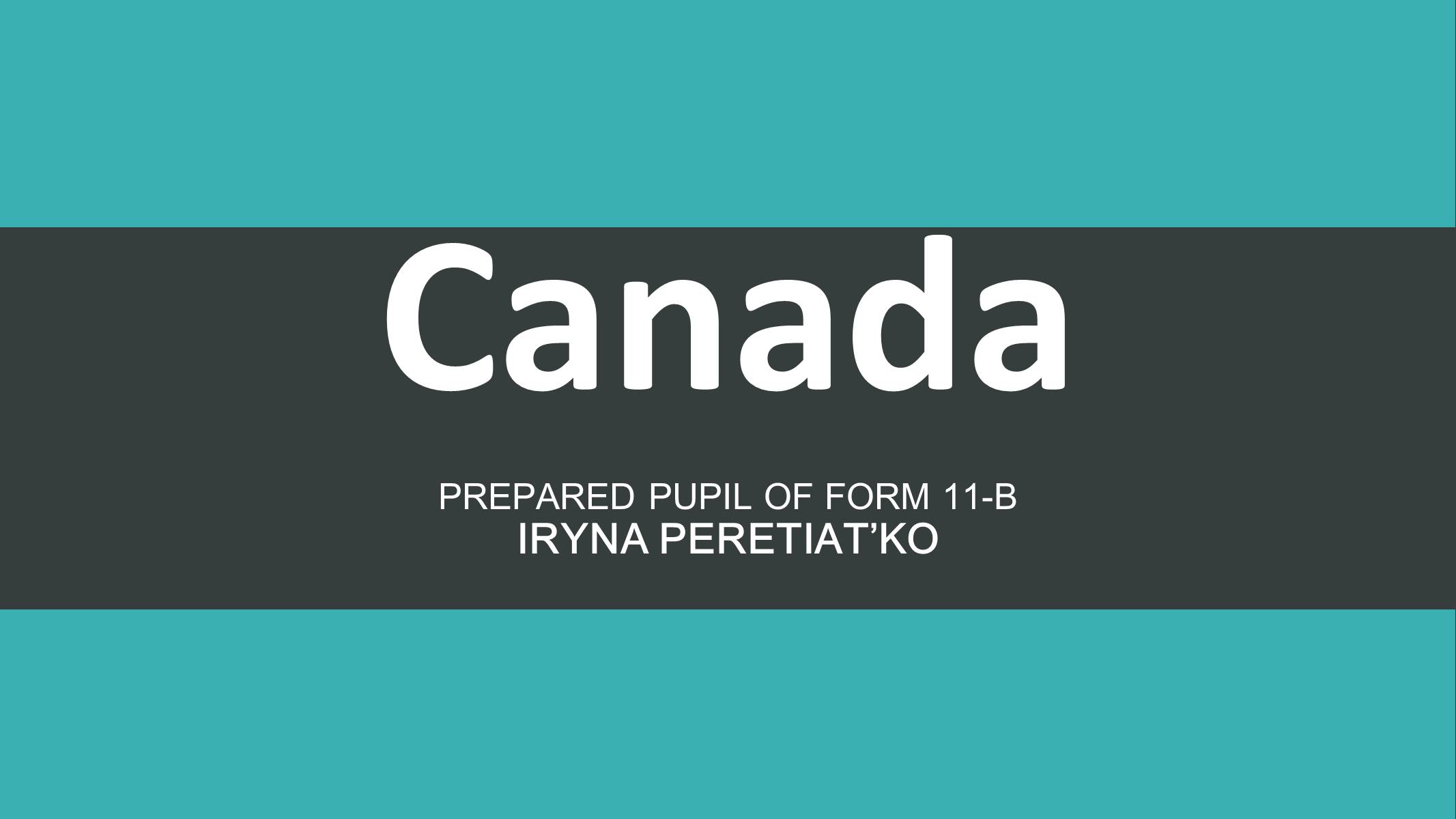
Слайд #2
Geographical Location of Canada
Canada is a country in North America consisting of 10 provinces and 3 territories.
Located in the northern part of the continent, it extends from the Atlantic to the Pacific and northward into the Arctic Ocean.
At 9.98 million square kilometres in total, Canada is the world's second-largest country by total area, and its common border with the United States is the world's longest land border shared by the same two countries.
Canada is a country in North America consisting of 10 provinces and 3 territories.
Located in the northern part of the continent, it extends from the Atlantic to the Pacific and northward into the Arctic Ocean.
At 9.98 million square kilometres in total, Canada is the world's second-largest country by total area, and its common border with the United States is the world's longest land border shared by the same two countries.
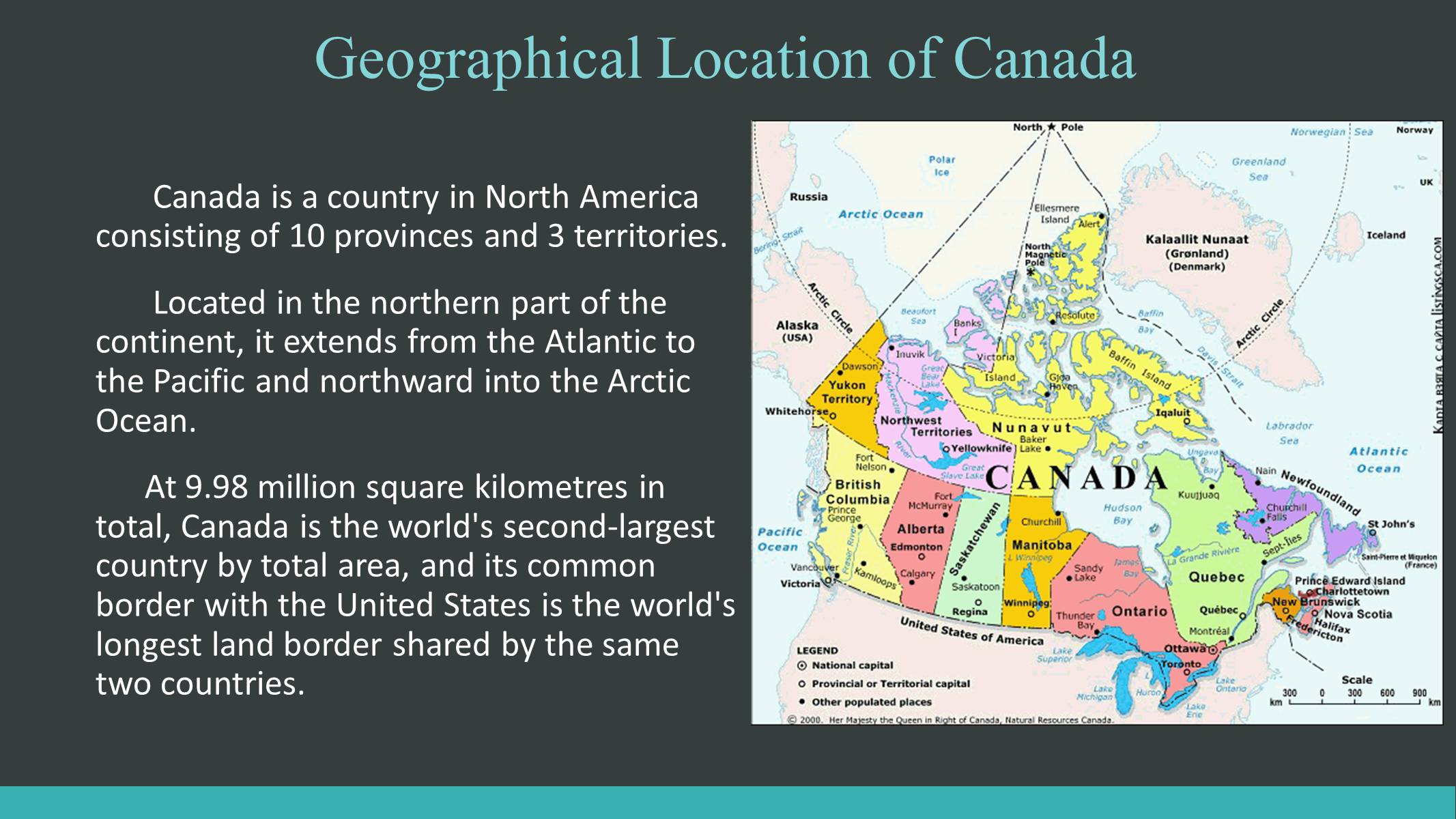
Слайд #3
History of Canada
The land that is now Canada has been inhabited for millennia by various Aboriginal peoples. Beginning in the late 15th century, British and French colonial expeditions explored, and later settled, the region's Atlantic coast. France ceded nearly all of its colonies in North America to the United Kingdom in 1763 after the French and Indian War.
The Seven Years' War's theatre of war in North America. The population grew steadily in subsequent decades, the territory was explored and additional self-governing Crown colonies were established. On July 1, 1867, three colonies federated, forming a federal dominion that established Canada under the British North America Act of 1867.
The land that is now Canada has been inhabited for millennia by various Aboriginal peoples. Beginning in the late 15th century, British and French colonial expeditions explored, and later settled, the region's Atlantic coast. France ceded nearly all of its colonies in North America to the United Kingdom in 1763 after the French and Indian War.
The Seven Years' War's theatre of war in North America. The population grew steadily in subsequent decades, the territory was explored and additional self-governing Crown colonies were established. On July 1, 1867, three colonies federated, forming a federal dominion that established Canada under the British North America Act of 1867.
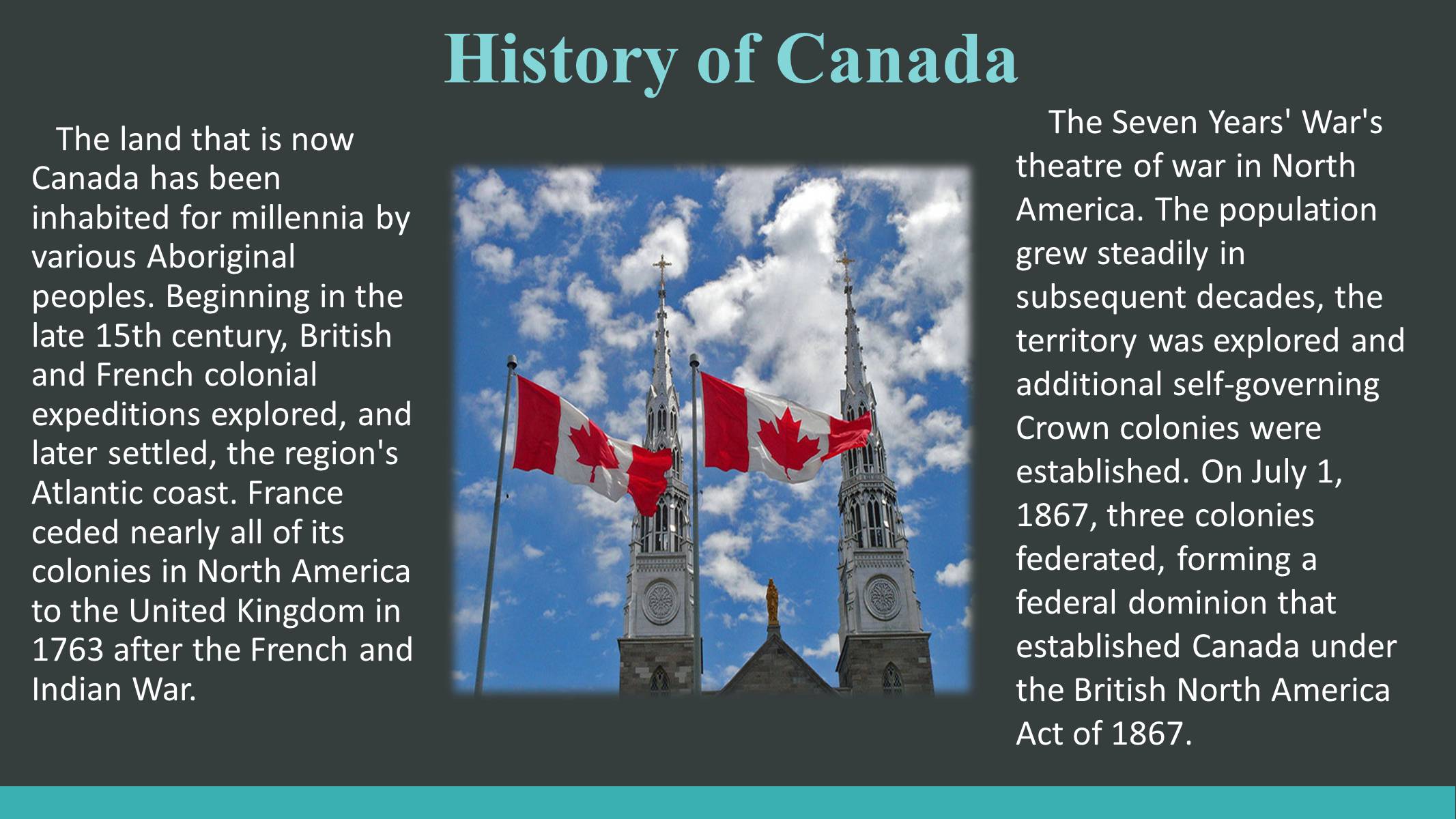
Слайд #4
Flag and coat of arms of Canada
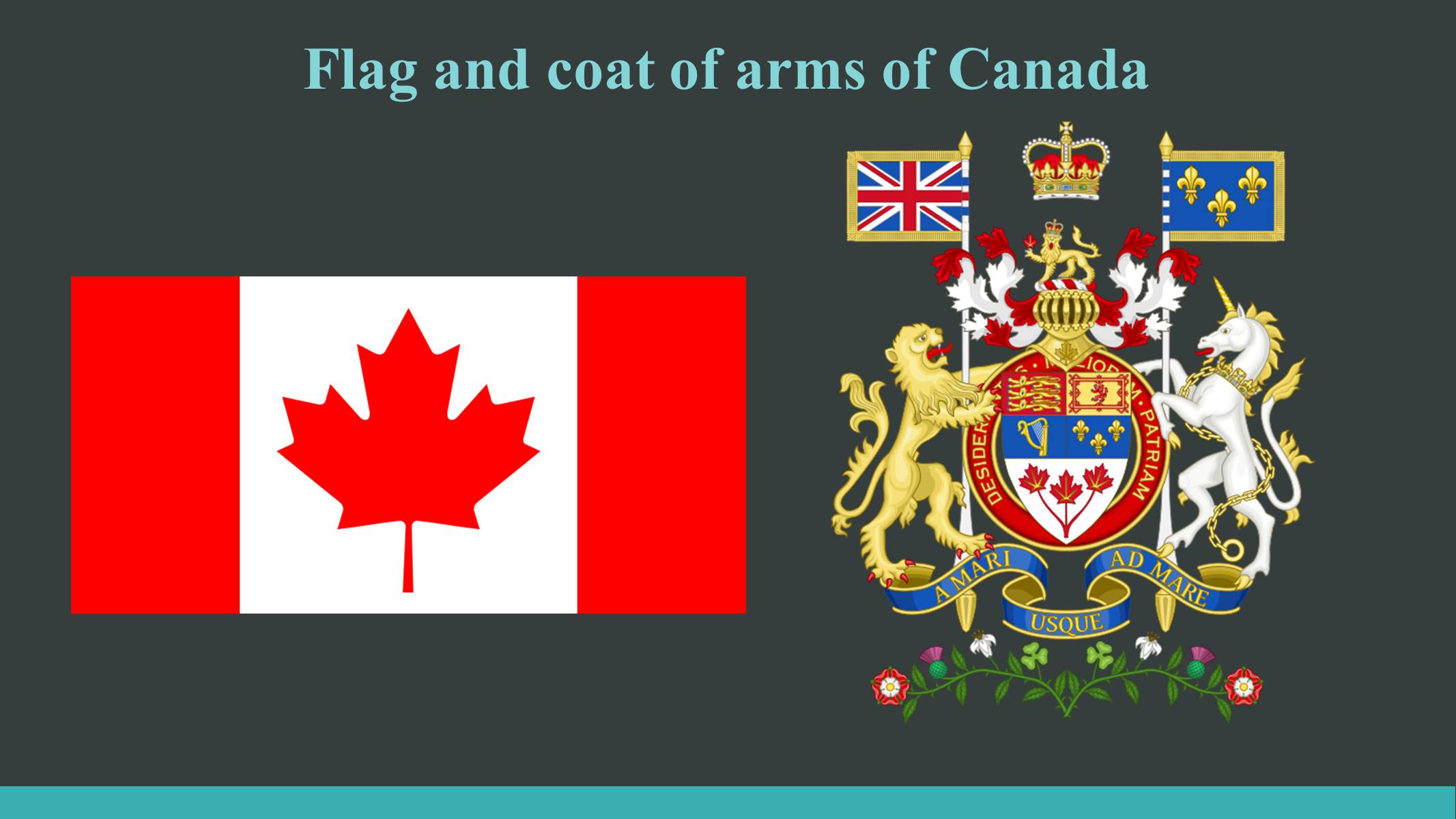
Слайд #5
Canada is a federal parliamentary democracy and a constitutional monarchy, with Queen Elizabeth II as its head of state. The country is officially bilingual at the federal level. It is one of the world's most ethnically diverse and multicultural nations, the product of large-scale immigration from many countries, with a population of approximately 35 million as of December 2012.
Its advanced economy is one of the largest in the world, relying chiefly upon its abundant natural resources and well-developed trade networks. Canada's long and complex relationship with the United States has had a significant impact on its economy and culture.
Its advanced economy is one of the largest in the world, relying chiefly upon its abundant natural resources and well-developed trade networks. Canada's long and complex relationship with the United States has had a significant impact on its economy and culture.
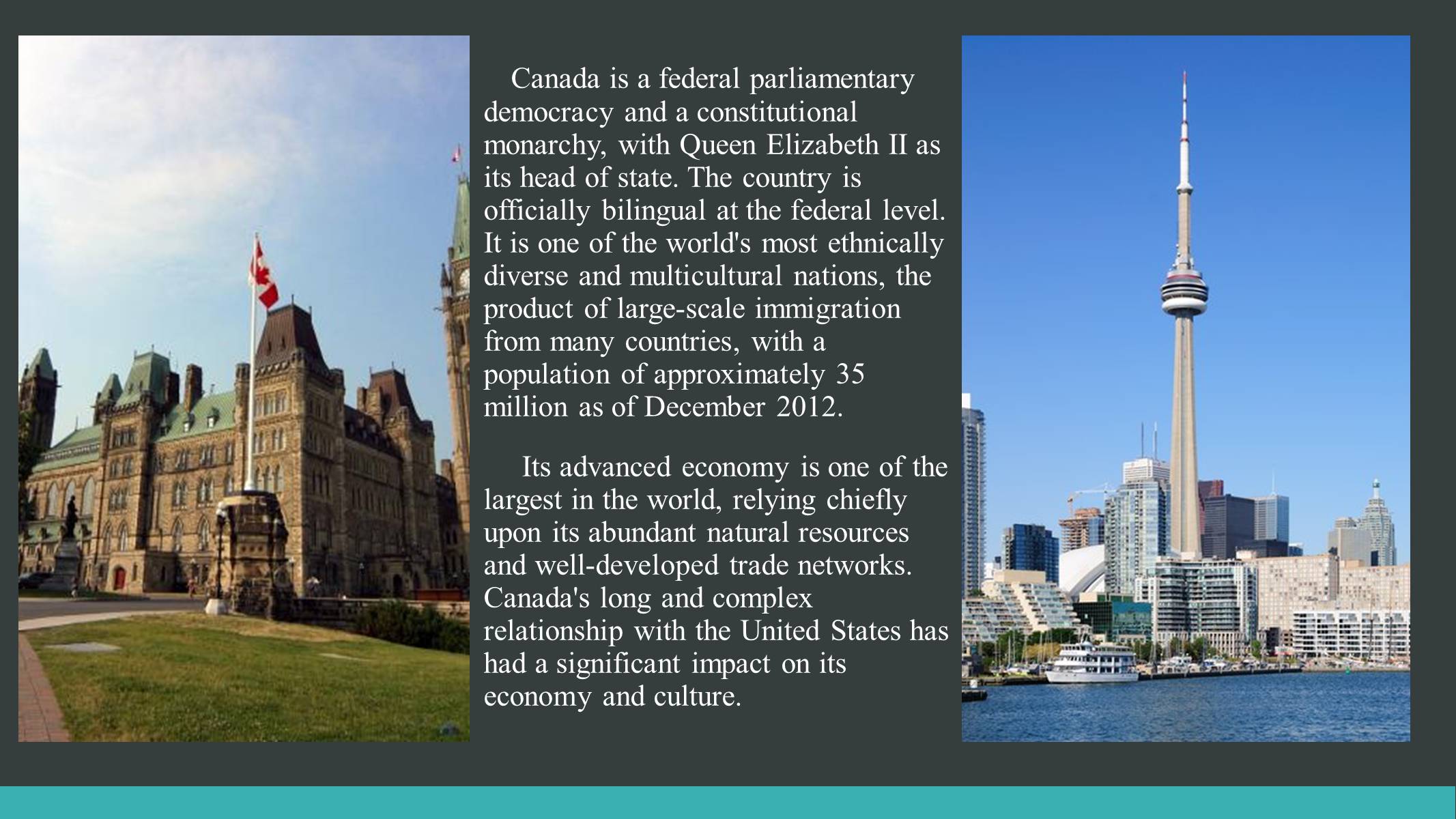
Слайд #6
The Senate chamber within the Centre Block on Parliament Hill
Parliament Hill in Canada's capital city, Ottawa
Parliament Hill in Canada's capital city, Ottawa
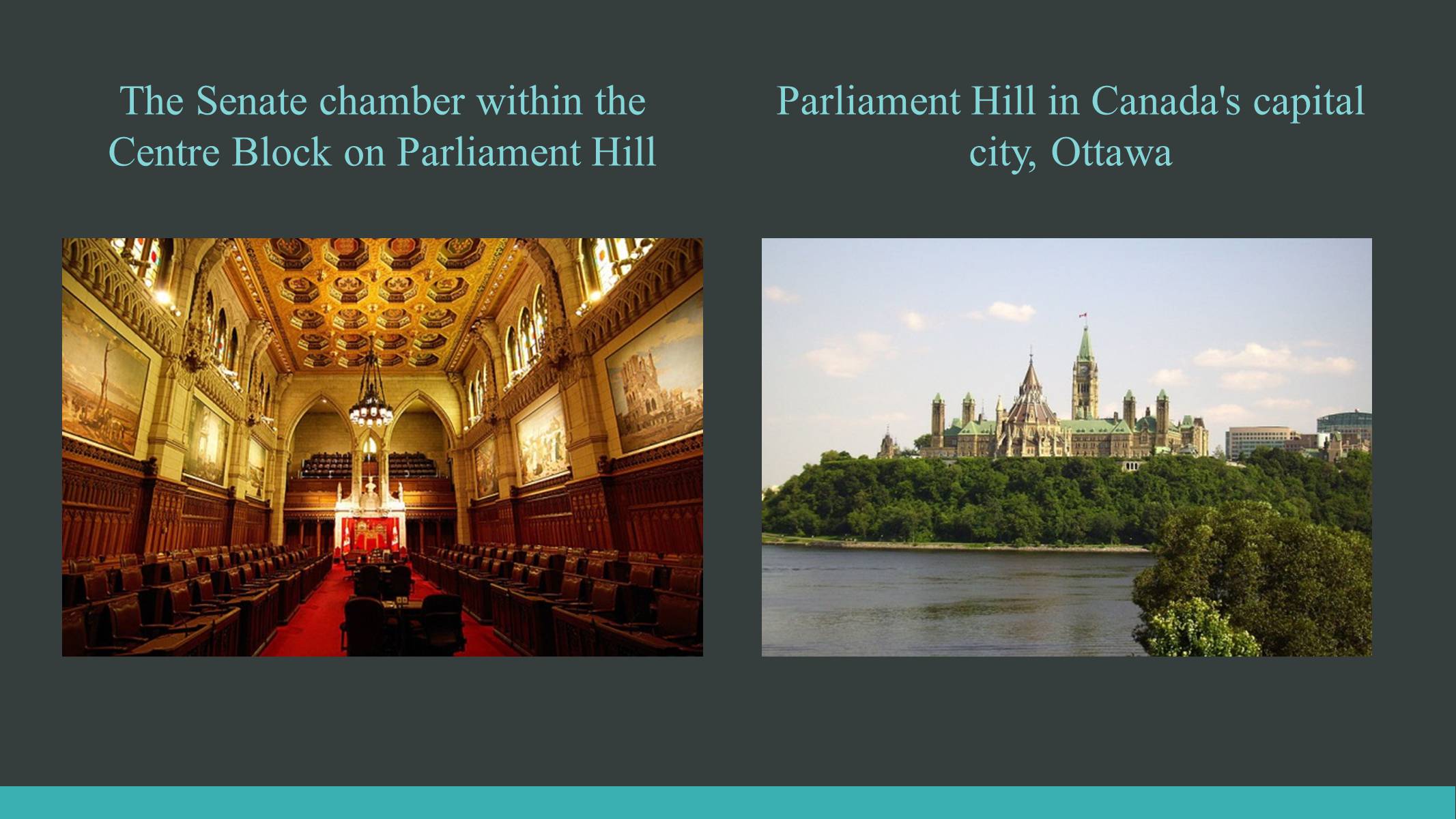
Слайд #7
Demographics of Canada
Population of Canada is about 35 millions people now.
The country's largest self-reported ethnic origin is Canadian , followed by English (21%), French (15.8%), Scottish (15.1%), Irish (13.9%), German (10.2%), Italian (4.6%), Chinese (4.3%), First Nations (4.0%), Ukrainian (3.9%), and Dutch (3.3%)
Population of Canada is about 35 millions people now.
The country's largest self-reported ethnic origin is Canadian , followed by English (21%), French (15.8%), Scottish (15.1%), Irish (13.9%), German (10.2%), Italian (4.6%), Chinese (4.3%), First Nations (4.0%), Ukrainian (3.9%), and Dutch (3.3%)
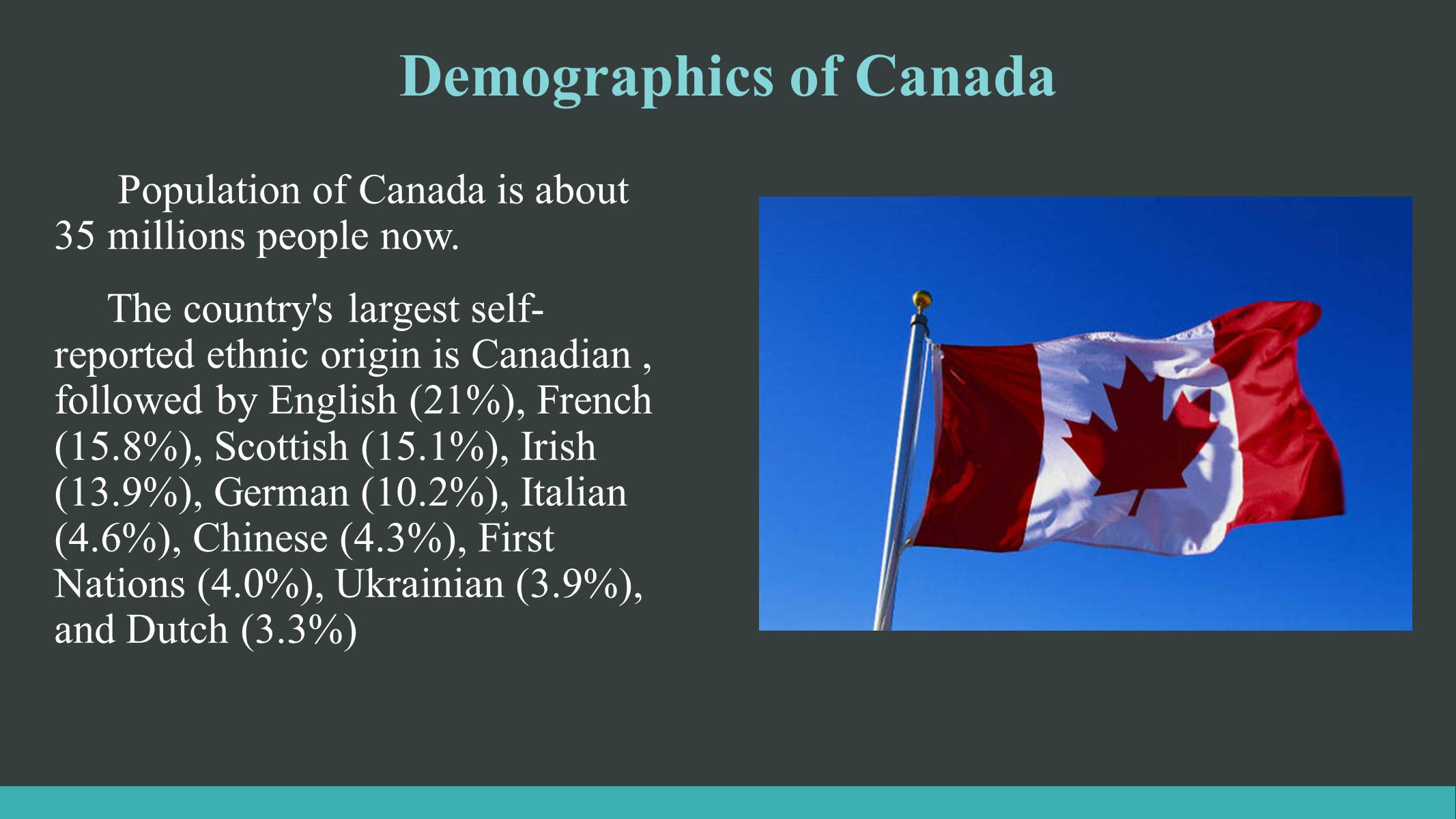
Слайд #8
Interesting facts about Canada
Bay of Fundy on the east coast of Canada between New Brunswick and Nova Scotia is famous for the highest tides in the world.
The Great Lakes are the largest in the world by area mirrors source of fresh unfrozen water.
Confederation Bridge linking New Brunswick to Prince Edward Island, 13 km long - the longest bridge in the world, built over ice-covered water.
Montreal Olympic Stadium Tower is the highest in the world leaning tower.
Hudson's Bay Company - the oldest company in North America.
Bay of Fundy on the east coast of Canada between New Brunswick and Nova Scotia is famous for the highest tides in the world.
The Great Lakes are the largest in the world by area mirrors source of fresh unfrozen water.
Confederation Bridge linking New Brunswick to Prince Edward Island, 13 km long - the longest bridge in the world, built over ice-covered water.
Montreal Olympic Stadium Tower is the highest in the world leaning tower.
Hudson's Bay Company - the oldest company in North America.
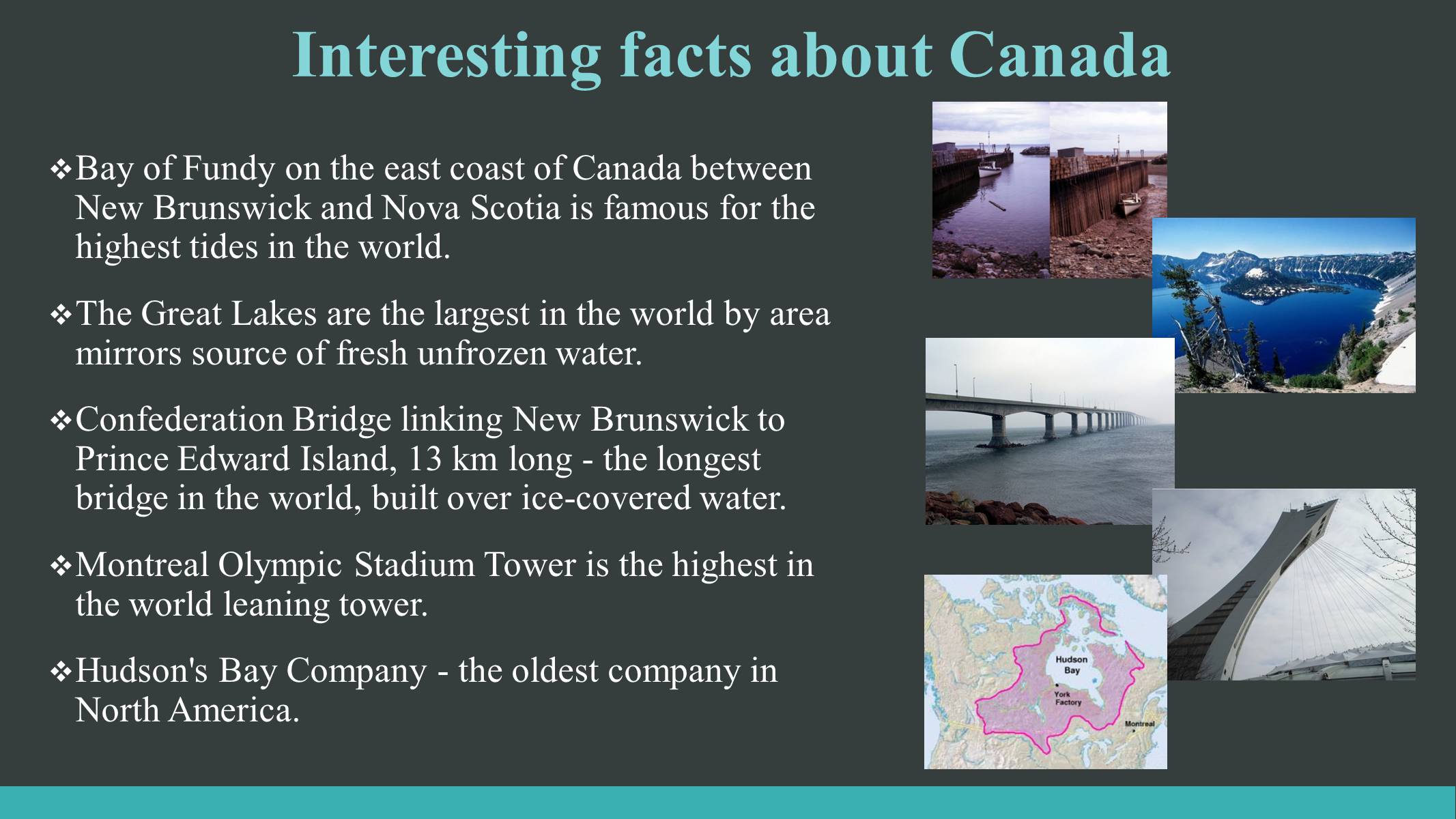
Слайд #9
Canada Attractions and Landmarks
The Hopewell Rocks are rock formations caused by tidal erosions located on the upper shores of the Bay of Fundy. Specifically, they are located at Hopewell Cape, which is near Moncton, New Brunswick. The base formations of the rocks are covered with water twice daily, but can also be seen from ground level at low tide.
With tides sometimes as high as 52 feet, the Hopewell Rocks are home to one of the highest average tides in the world. Also in the area is Fundy National Park, which has approximately 110 kilometers of hiking trails, 40 kilometers of mountain biking trails, along with numerous camping areas.
The Hopewell Rocks are rock formations caused by tidal erosions located on the upper shores of the Bay of Fundy. Specifically, they are located at Hopewell Cape, which is near Moncton, New Brunswick. The base formations of the rocks are covered with water twice daily, but can also be seen from ground level at low tide.
With tides sometimes as high as 52 feet, the Hopewell Rocks are home to one of the highest average tides in the world. Also in the area is Fundy National Park, which has approximately 110 kilometers of hiking trails, 40 kilometers of mountain biking trails, along with numerous camping areas.
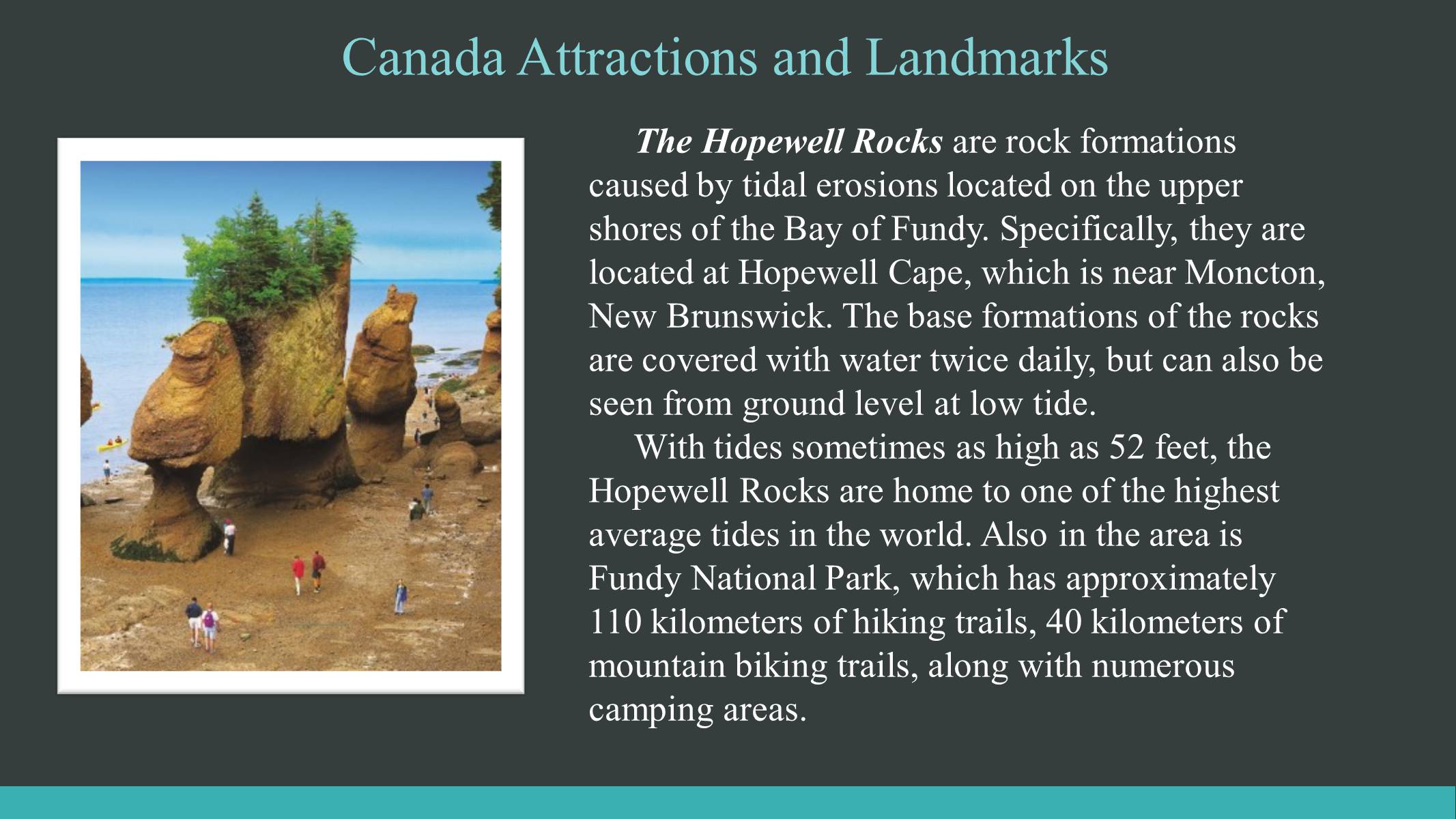
Слайд #10
Chateau Lake Louise
Located on the eastern shore of Lake Louise, near Banff, Alberta, Chateau Lake Louise was originally built in 1890. Built by the Canadian Pacific Railway, Chateau Lake Louise is “kin” to the Banff Springs Hotel and the Chateau Frontenac. The area around the hotel is part of Banff National Park, which is also declared a World Heritage Site by UNESCO.
Since 1982, the hotel is opened year-round and offers endless activities for nature lovers, including hiking, canoeing, skiing, snowboarding, ice skating, ice sculpture contests, snowshoe excursions and sleigh rides, just to name a few. This top Canadian tourist destination has been visited by Christopher Reeve and Marilyn Monroe.
Located on the eastern shore of Lake Louise, near Banff, Alberta, Chateau Lake Louise was originally built in 1890. Built by the Canadian Pacific Railway, Chateau Lake Louise is “kin” to the Banff Springs Hotel and the Chateau Frontenac. The area around the hotel is part of Banff National Park, which is also declared a World Heritage Site by UNESCO.
Since 1982, the hotel is opened year-round and offers endless activities for nature lovers, including hiking, canoeing, skiing, snowboarding, ice skating, ice sculpture contests, snowshoe excursions and sleigh rides, just to name a few. This top Canadian tourist destination has been visited by Christopher Reeve and Marilyn Monroe.
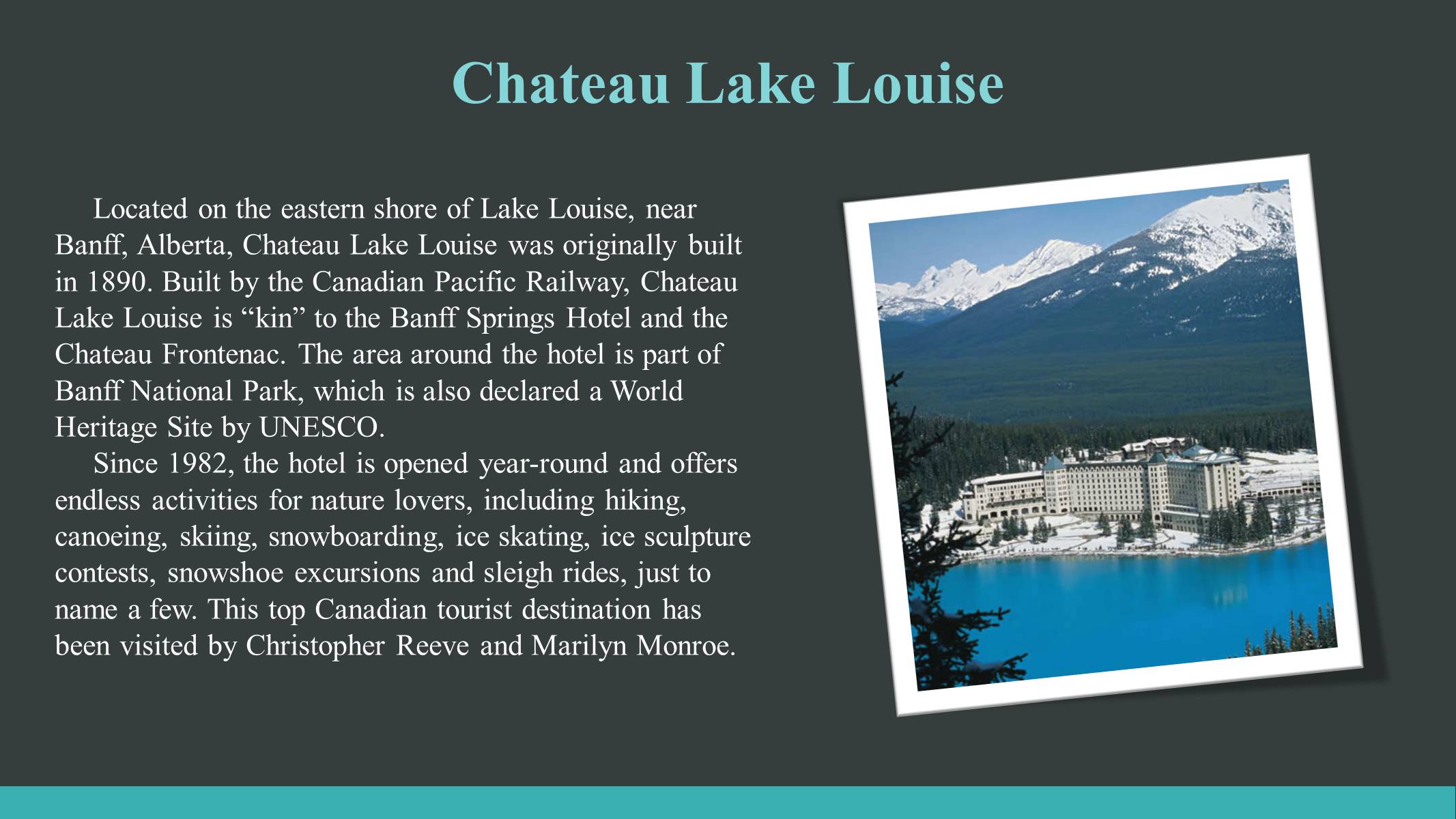
Слайд #11
The Canadian Rockies
Known as a major mountain range in western North America, The Rocky Mountains extend more than 3,000 miles between the state of New Mexico in the United States and the province of British Columbia in Canada. The Canadian Rocky Mountains range from British Columbia to Alberta.
The Canadian Rockies are also known for their high peaks. Four national parks that are located in the Canadian Rockies are part of the World Heritage Site. These parks are Banff, Kootenay, Yoho and Jasper. There is another park, called Waterton, which is not part of the World Heritage Site.
Known as a major mountain range in western North America, The Rocky Mountains extend more than 3,000 miles between the state of New Mexico in the United States and the province of British Columbia in Canada. The Canadian Rocky Mountains range from British Columbia to Alberta.
The Canadian Rockies are also known for their high peaks. Four national parks that are located in the Canadian Rockies are part of the World Heritage Site. These parks are Banff, Kootenay, Yoho and Jasper. There is another park, called Waterton, which is not part of the World Heritage Site.
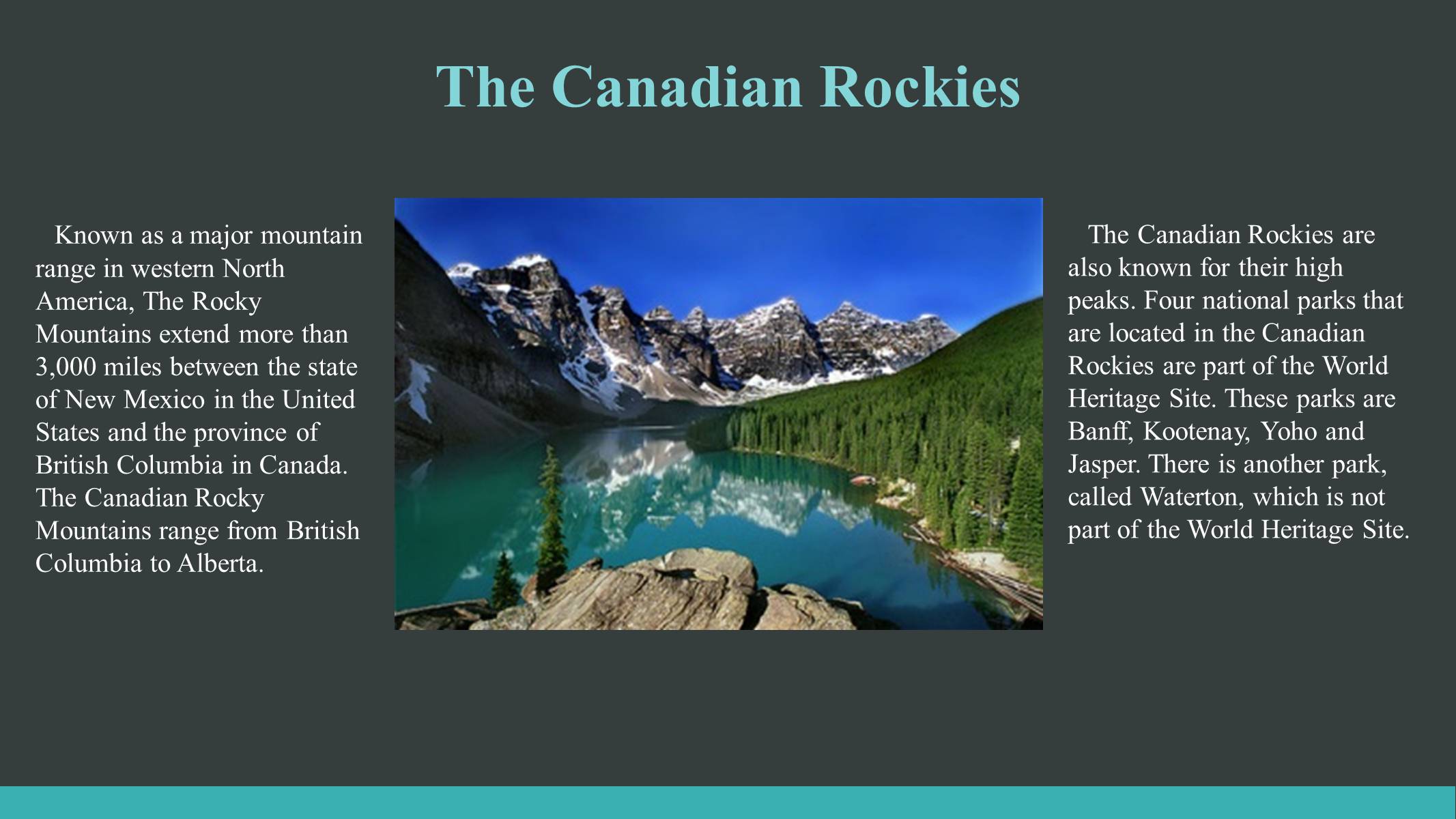
Слайд #12
Niagara Falls
The Niagara Falls are situated on the Niagara River which lies on the border of the province of Ontario and the state of New York. The Horseshoe Falls are located on the Canadian side of the border. The Niagara Falls are the most powerful waterfall in North America with an average of 4 million cubic feet of water falling over the crest line every minute. The Horseshoe Falls dispense 90% of the water from the Niagara River and are also a valuable source of hydroelectric power.
The Niagara Falls are situated on the Niagara River which lies on the border of the province of Ontario and the state of New York. The Horseshoe Falls are located on the Canadian side of the border. The Niagara Falls are the most powerful waterfall in North America with an average of 4 million cubic feet of water falling over the crest line every minute. The Horseshoe Falls dispense 90% of the water from the Niagara River and are also a valuable source of hydroelectric power.
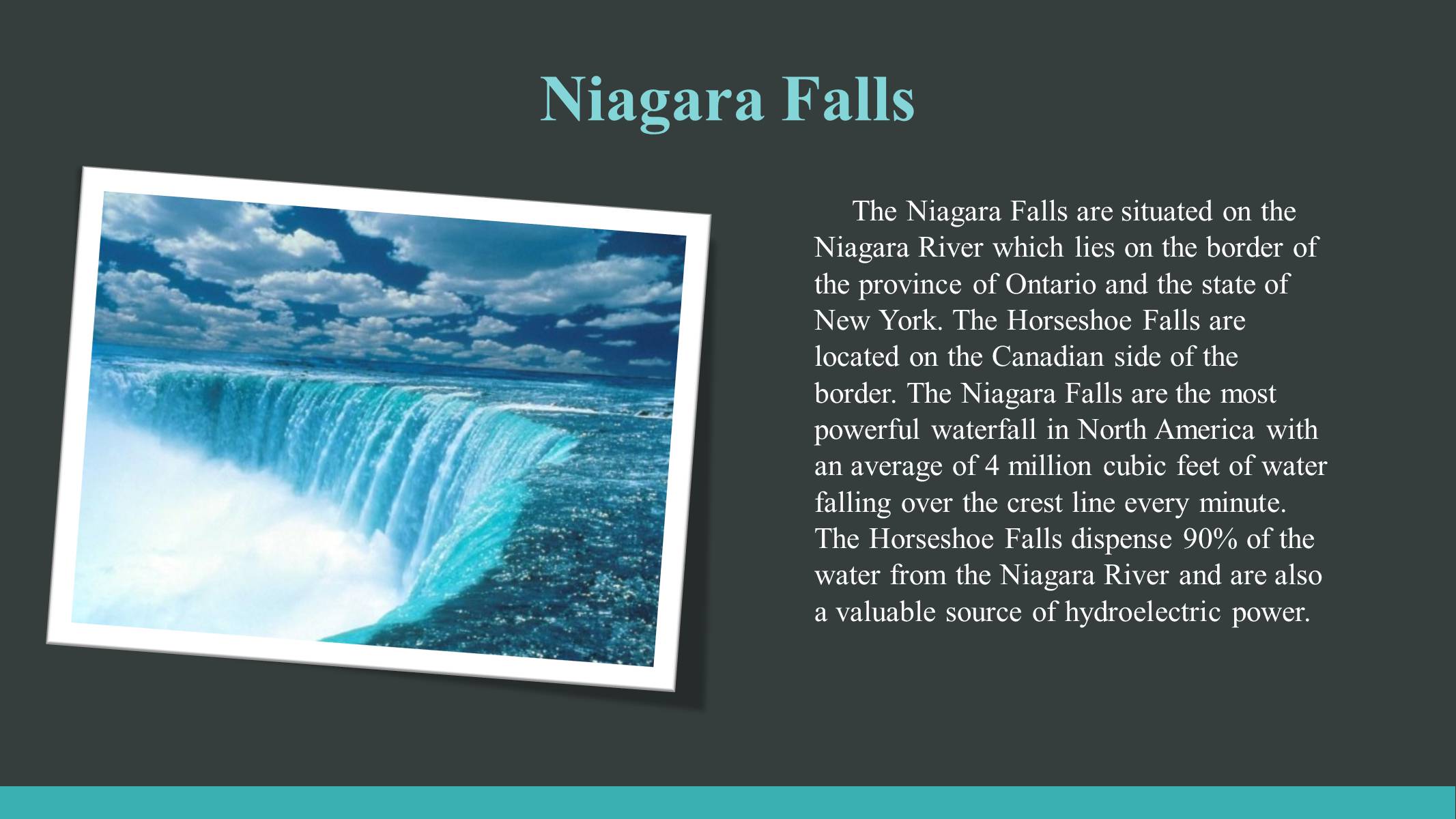
Слайд #13
Thank you for attention!
